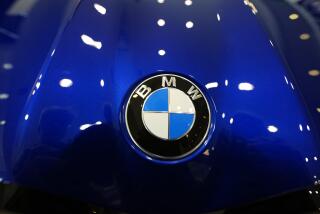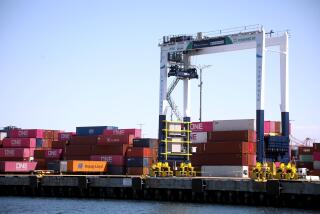BMW to Put 1st Hydrogen Cars on the Road in 2007
- Share via
German automaker BMW said Tuesday that it would begin distributing the world’s first hydrogen-burning cars to selected users in the U.S. and Europe next year.
The cars are 7-Series sedans powered by 12-cylinder internal-combustion engines capable of burning gasoline or liquefied hydrogen.
BMW, which has been working on hydrogen fuel technology since 1978, will build and distribute about 100 of the vehicles for a variety of uses, said Christoph Huss, vice president for science and traffic technologies.
Automakers believe that hydrogen, the most plentiful element on the globe, could ultimately replace petroleum as the principal fuel for cars and trucks -- although numerous issues need to be resolved.
The first of the so-called Hydrogen-7 models, which follows several earlier generations of experimental BMW hydrogen-burning cars, are expected to be delivered in the first half of 2007, Huss said.
Users, who would not be charged for the cars, could include politicians, celebrities, drivers in corporate fleets and members of the public. Some would receive the cars for prolonged periods, others for short test drives.
“If President George Bush said he wanted one for the next two years, we wouldn’t say no,” BMW spokesman Andreas Klugescheid quipped.
As many as 30 of the cars will be distributed in the U.S., with California a prime test area because BMW already has a liquid hydrogen fueling station at its North American engineering test center in Oxnard. Huss said BMW would work with energy companies to install fueling facilities for the program.
BMW has not put a time limit on the test period, although Huss said it would last “more than one year but not so long as 10 years.”
Huss said the European version of the cars could travel about 125 miles using hydrogen before switching over to gasoline for an additional 400 miles.
That’s equivalent to about 20 miles per gallon on gasoline and 16 mpg on hydrogen.
The cars’ V-12 engines produce 260 horsepower and can accelerate from zero to 62 mph in 9.5 seconds, with an electronically limited top speed of 143 mph.
Huss said BMW was still “very far away from mass production” of the Hydrogen-7 but wanted to put the cars in use to gather real-world information.
General Motors Corp. and other big carmakers are working on fuel-cell vehicles that would use hydrogen in an electrochemical process to produce electricity to power a motor.
BMW’s process eliminates the need to develop an entirely new type of power plant. Still, it faces many of the same challenges as fuel-cell technology, including the establishment of a hydrogen fuel manufacturing industry and a fuel storage and distribution system.
Liquid hydrogen requires special storage and retail pump systems because the gas must be cooled to minus 425 degrees and would instantly freeze a human hand if touched.
Unlike fuel cells, a hydrogen-burning internal-combustion engine cannot eliminate polluting emissions. That’s because traces of carbon monoxide are produced whenever engine lubricants are vaporized, and nitrogen oxides are emitted in any combustion process.
But the hydrogen engine’s basic byproducts are distilled water and steam, the same as with a fuel cell, and BMW says the hydrogen car is far cleaner than any gasoline car.
Ford Motor Co. and Japanese affiliate Mazda Motor Corp. also are working to develop internal-combustion engines that run on hydrogen.






